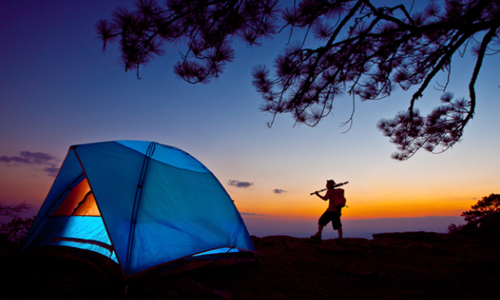

Parks and day hikes are well and good, but if you really want to reconnect with Mother Nature this summer, you’ve got to go camping.
For some, camping is a refreshing change: A chance to reset the mind and soul by roughin’ it for a few days. For others, the idea of living outside the realm of wifi and indoor plumbing is a terrifying prospect. Regardless of which end of the spectrum you identify with, it’s important to realize that wandering around in the wilderness can be dangerous … for the wilderness, that is.
Just like when planning a low-impact summer BBQ, it’s important to realize that most “camping stuff” you see in Big Box Stores is just low-quality junk designed to make camping feel like another day at home. This both defeats the purpose (it’s supposed to feel like nature, not home) and threatens the vitality of wilderness areas.
Whether you’re planning a weekend stay in a national park or setting out on a week-long backpacking trip, keep these tips for greener camping in mind:
1. Reusables Rule
Pitching a tent is no reason to throw all your eco-friendly habits out the window. Just because you’re going camping doesn’t mean you should spend a small fortune on disposable plates, cups, cutlery or napkins/towels. Pack unbreakable-but-washable versions of each, and bring along a) a small basin/bucket, sponge and biodegradable soap; and b) a breathable bag in which to toss cloth napkins and towels that are too dirty to reuse.
2. Non-Toxic Sunscreen and Bug Spray
Camping is awesome, but throw in a sunburn and a swarm of biting insects and it quickly becomes a nightmare. Venturing far from home might make you want to reach for the strong chemicals—but don’t! They’re toxic to the air, water and animals you’ll be visiting, as well as your own health. Instead try safer alternatives like Goddess Garden Sunscreen or make your own natural sunscreen and bring along one of these eight natural mosquito repellents.
3. Solar Lantern and Chargers
One of the first things novice campers usually notice is how much darker rural areas are at night. You could stock up on AA and D batteries to power your headlamps, flashlights and lanterns, or you could invest a little more in a lighting option that runs off solar power—like the LuminAID light. This solar powered, inflatable lamp packs flat and inflates to create a lightweight, waterproof lantern. You might also want to bring along a solar charger to keep your emergency phone and/or GPS powered up (i.e., your essentials, not a DVD player and mini-fridge).
4. Bulk Water and Refillable Water Bottles
I can’t tell you how many times I’ve seen people unload a case (or two!) of bottled water at their camp site. This is not only silly and wasteful, it also creates more work since most parks require campers to pack out their trash. Instead, fill a large container (like those used for water coolers) or buy a couple of gallons from which you can refill your water bottle during the trip.
5. Know How to Go
What happens when nature calls on a camping trip? It’s important to know where and how to dispose of human waste on the trail. If you’re in an established campground, there’s likely an outhouse or composting toilet nearby. Use that. If you’re deeper into the wilderness, it’s not quite so easy. First, you’ll need to bring your own toilet paper. Second, you’ll need to find a secluded spot that’s at least 200 feet away from any other campsites or water sources. Third, you’ll need to dig a hole that’s at least 6 inches deep. After you’re done doing the deed, cover it back up. Lastly, bring along a paper bag in which to deposit the soiled toilet paper until you can find a proper receptacle. Do NOT leave it in the woods.
6. Leave Only Footprints, Take Only Pictures
——–
YOU MIGHT ALSO LIKE
The #1 Way to Improve Your Life? Nature
Award-Winning Books That Deepen Our Connection to the Natural World
Doctors Prescribe Spending Time In Parks
——–

 233k
233k  41k
41k  Subscribe
Subscribe 